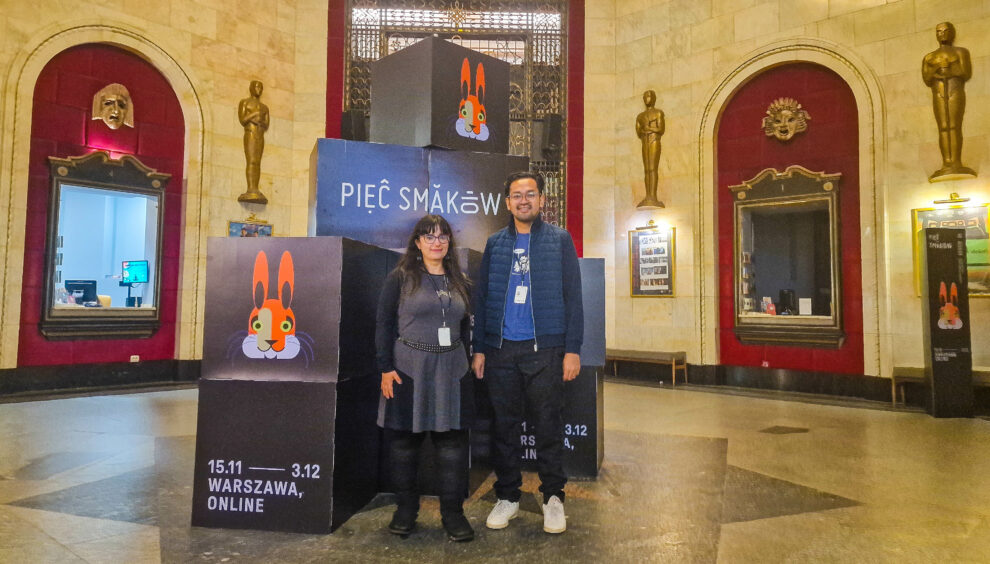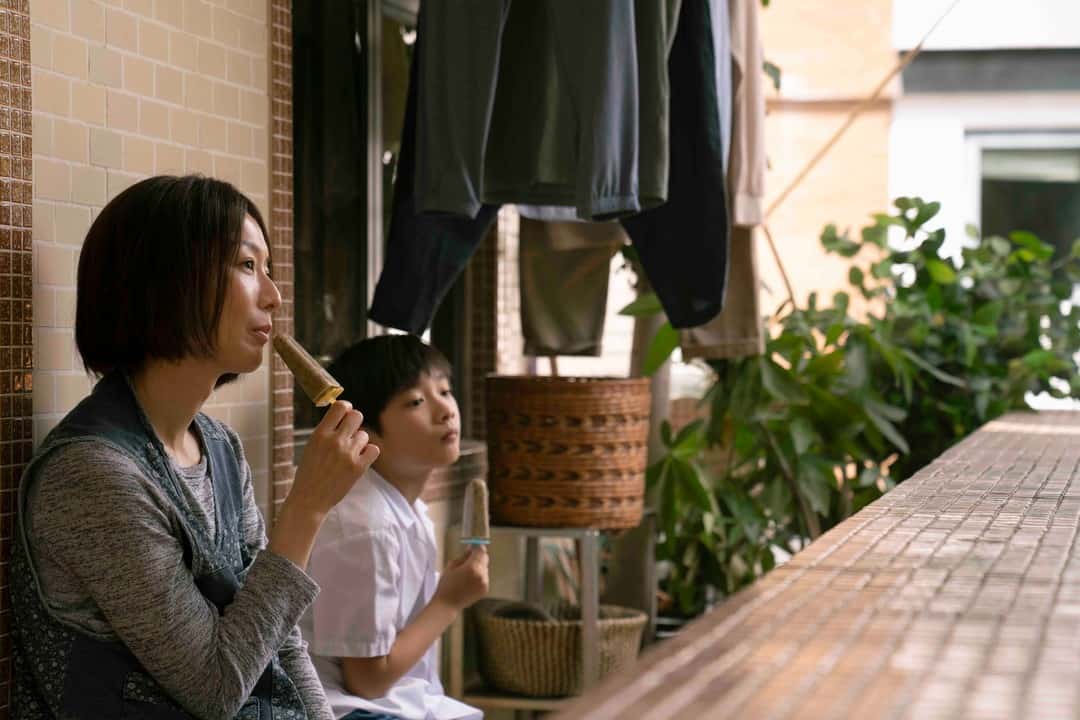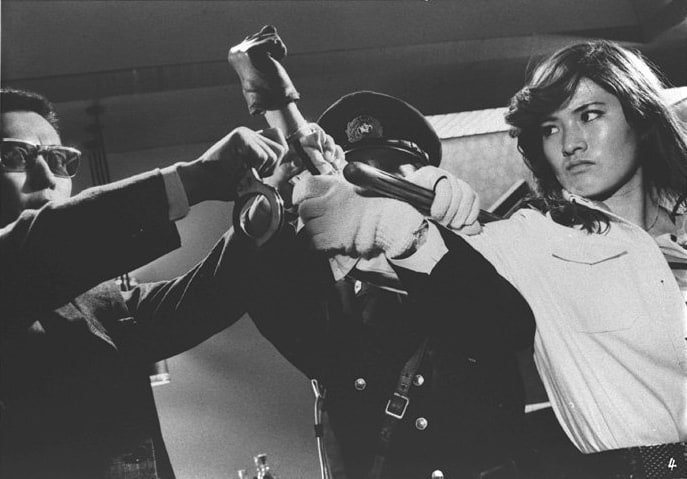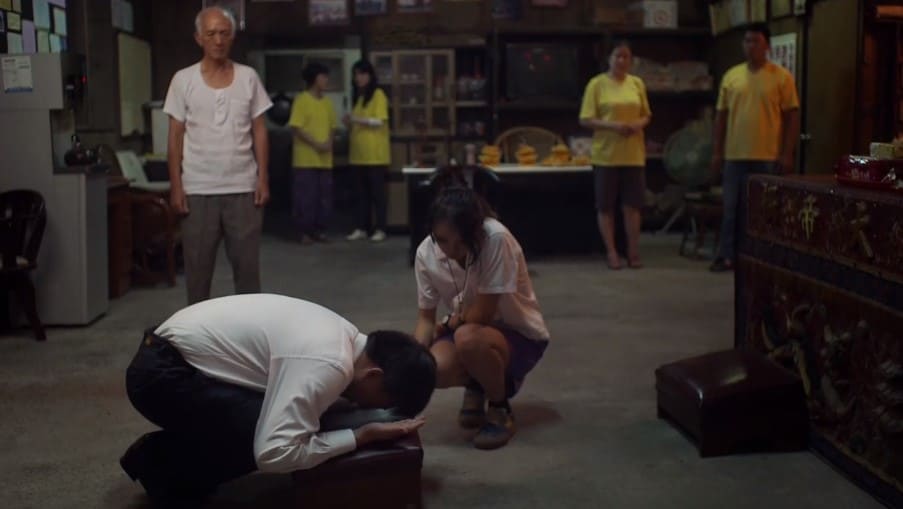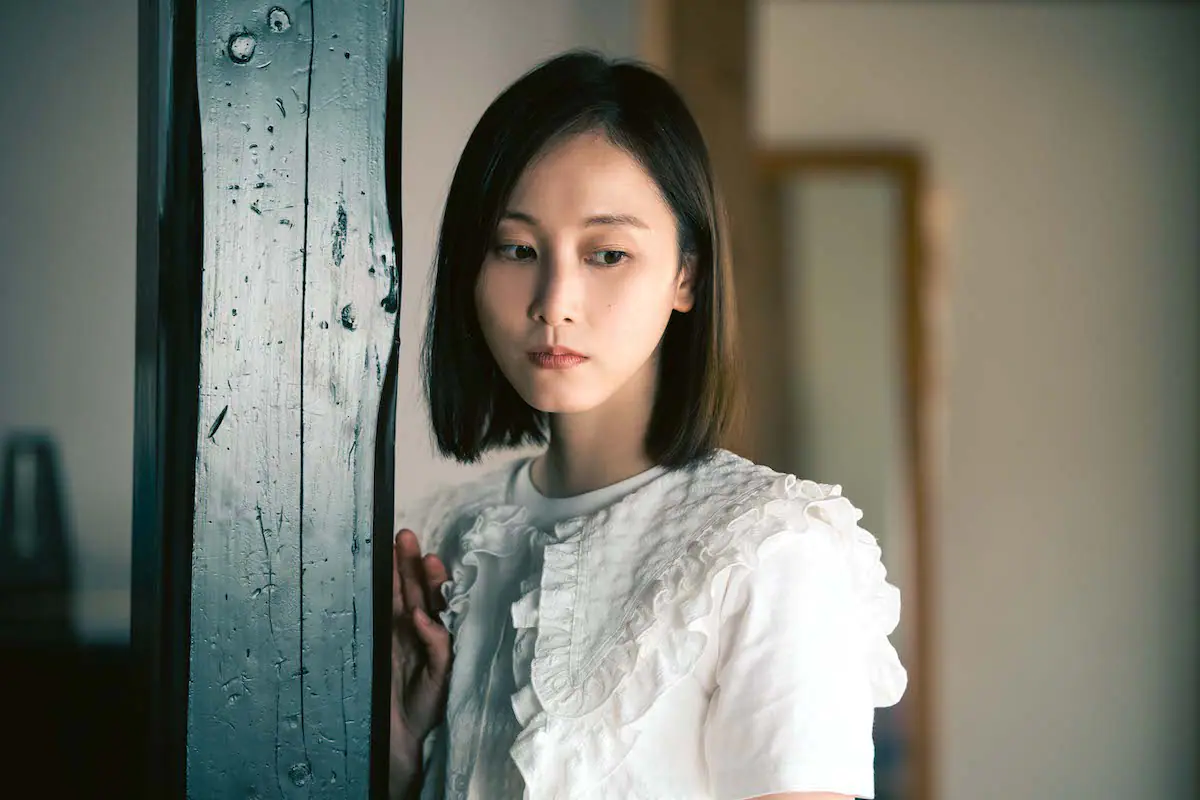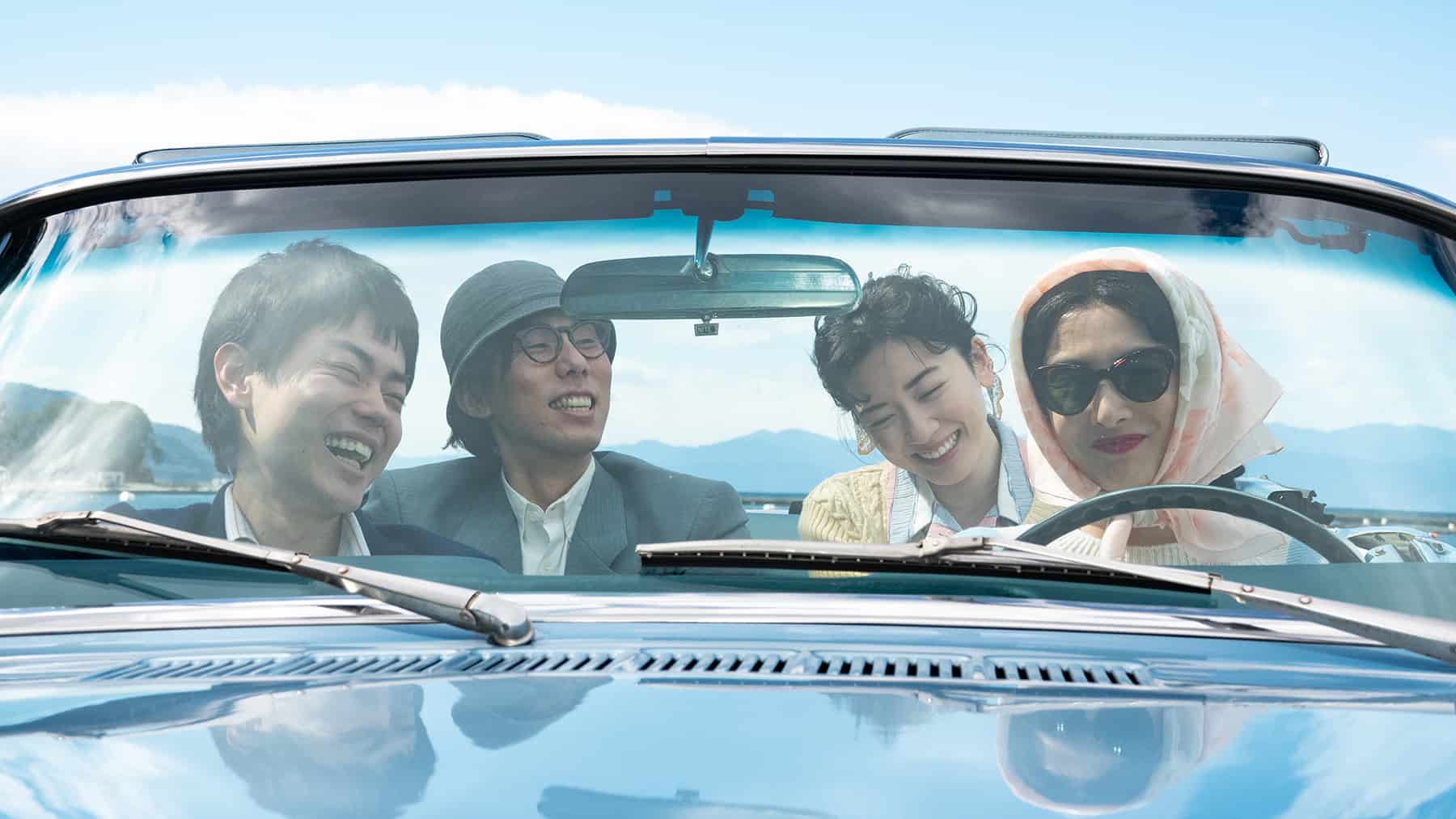A year after its premiere in Venice, Makbul Mubarak's debut feature “Autobiography” keeps impressing the festival audiences. On the occasion of screening during the Five Flavours Film Festival, we met with the director to delve into the concept of historical trauma and how it affects younger generations who were born into it. We also discuss the complexities of loyalty within Indonesian society, dynamics of power and what it means to be a good person, among other topics.

In the opening sequence of the movie, Rakib is watching a game of chess. But it's not just a game, but the particular match from the important tournament: the world championships' rapid chess game between Viswanath Anand and Magnus Carlsen. I do believe that things like that don't occur in movies without a reason… So what's your reason behind it?
Thank you for catching that. I chose this particular match because it's a battle between two generations. I think Vishy Anand represents a generation before Carlson…
Yes, he is the old Grandmaster…
So we have the old Grandmaster vs. the young Grandmaster… Many people didn't get this hint, because it happens too early in the movie… I wanted to foreshadow from the very first shot that my story will be about two generations metaphorically playing chess against each other. And not just chess in a literal meaning, but the mental chess as well as the political chess. The opening scene is always so crucial for me. I want to put the audience right into what the film is going to be about, thematically or emotionally.
And do you play chess?
I play on my phone. (laugh). During my research, I went to a village, where I watched a chess tournament. I was astonished that so many people there were playing. Usually, when we watch a professional tournament, chess players are silent. But in this place, everyone chatted while playing, exchanging views on politics, commenting on the president, or asking questions like: “Why did you vote for that guy?.” Or just shared some random information like “the running water today is not clean water.” So it occurred to me that we have an interesting connection between chess, leisure time, and politics.
Also, in the movie Rakib plays with the general. So you continue with this parallel of generational battle.
Yeah, he plays with the general, who played with his father. We know that Rakib's father taught him chess. So there is something that chess does to these three people. It is something that connects them, but also informs us a lot about the nature of their relationship.
Some dynamics of power involved…
Yes. There's a king and there's a pawn. “Autobiography” will be released in France and the French title is “De Pion de General,” which means “the pawn of the general.” So they're taking the chess metaphor quite seriously. And I think it's a very nice icon for this film.
Now when you mentioned the title… The movie is neither the autobiography of Rakib nor the general. And despite you took some inspiration from your family history, it's also not your autobiography. So I wonder what “autobiography” refers to. Is it the autobiography of a generation? Or is there maybe some other reference?
Yes, it's a little bit of everything. It's partially inspired by my own family story, so autobiographical in that sense. But also, it's an autobiography of our country, of a very short transitional period, while the film itself is about the relationship between two people. So the title reflects history writing itself through the interaction between these two characters. There was an element of literal autobiography when we were developing the script. Then I dropped it, but I decided to keep the old title. And I think it's compelling that after watching the movie we can raise these questions: Why is it called autobiography? Whose autobiography is it? And I think it's a good starting point to think deeper about the film.
Check also this article
That's true. You're a representative of Rakib's generation. From your perspective, do you feel the generational trauma of elders has had an impact on younger people?
Yes. There's something very elusive about historical trauma because most of the time, we don't know where it comes from. We were not alive back then. We were born in another reality. So we are traumatized by something we have never experienced directly. It's so unlike personal trauma. Let's imagine you fell from a bike when you were a kid or you got humiliated at some point. You experience some issues and then your psychotherapist will tell you it comes from particular moments in your life, and you can trace it back. But historical trauma is very different. No psychotherapist will tell you where it comes from. You are born with it, so you feel the trauma, but you're not sure whether it's a trauma, it's just life or it's who you are. And in Indonesia, it's not openly discussed, because most of the people who lived in that era are still alive and they're still in power. So it's very different. For example, let's take Germany. The Third Reich, right after the Second World War, they were put on Nuremberg trials. The nation discussed the history and reversed the narration of Nazi times. Meanwhile, in our country, all those events from the past are still officially the official narrative. Indonesia is theoretically a democratic country, but when you talk about those historical topics, it's not very democratic, because the law restricts the discussion.
It's repressed…
The calls for accountability are silenced. I'm not a Communist myself, but it's written in the law that Communism, Leninism, and Stalinism are forbidden. And everything related is forbidden. To remind you, there was a very pro-US government in the 60s when a huge genocide happened. Almost 2 million people accused of being Communists were killed. So I think this is the second biggest Holocaust after the Holocaust by Nazis. But the world doesn't know about it, because even Indonesians, a lot of us, do not know about it. Those massacres are not being spoken about in schools, it's the ousted theme. And I think trauma is born of silence. A very Freudian thing, this repression. Trauma comes from repressed unconsciousness. And this is what our history is doing to our nation. Instead of telling and teaching us things, it's hiding something from us. When we feel something, but we're not able to talk about this thing, it gives us an uneasy feeling. We ask ourselves who are we. And this is the feeling that ”Autobiography” wants to capture. There's something dangerous lurking underneath…
This is something the audience here in Warsaw can relate to because in Poland we bear this inherited trauma of the Second World War. Even for younger generations, it's still something that persists in society and is rooted in mentality, despite we are talking about it and we have it present in history books. For many, it's still not easy to deal with.
You talk about the German invasion, right? In the case of Indonesia, it's different. We were colonized by many countries and by many European powers. I think the longest-lasting among them was the Netherlands. In Indonesia, when we're talking about colonialism, it feels not as hurtful as what happened in the 60s. We can point fingers “It's the Dutch who did it.” So there is a very easy dichotomy between “us” and “them.” They colonized us and they're not us. But with the trauma caused by what we call the regime, the New Order regime, it's more difficult, because it was done by our government. So the dynamics are more complex. We were repressed by our own people and they're not going away, because they belong here as well. They're also citizens. So we call it “dictatorship,” not “colonialism.”
It feels like a trap because there's an external danger that is coming from the inside source. Watching “Autobiography” I had a strong sense of being trapped and that Rakib is trapped.
Yes, I wanted to create this atmosphere. I think when you have to oppose someone who is a stranger to you, who is not your family member, or even not your boss, it's easier to deal with conflict. I am not saying it's easy, but it seems more simple, this me versus you dynamics. But when your opponent comes from your own family or is your landlord, it becomes tense. It creates that sense of entrapment. The person you hate may be the person who loves you. So it becomes toxic in that way.
Referring to that, I'd like to discuss loyalty, because Rakib has been loyal to the general from the very beginning, and it's something granted because the boy's father and grandfather also served the general and his family. Now Rakib is doing that. So I wonder about the value of loyalty in Indonesian society. Was it just Rakib, who was young and needed a role model or is there a value of being loyal no matter what. So you serve the general, despite he's supposedly responsible for heinous crimes.
Well, yes, that's the problem. I think in most Asian countries, family is the center of the universe, not an individual. So unlike in Europe, where the responsibility and the center of attention is on the individual. And when the family is at the center of everything, loyalty is one of the most precious values. You have to be loyal to your family. That's why in a lot of dictatorships, including Indonesia at that time, the dictator used the family as a model to run the country by calling himself the father of the nation, which also meant every citizen was his son. Therefore, because we have to be loyal to our family, we have to be loyal to the ruler as well. In Indonesia, there was a money bill showing the image of the president as the father of development. So he always referred to himself as the father of something. And it's so weird that in Indonesia, in every field, we have the father of this field, like “the father of telecommunication,” “the father of music,”, and this element of “fatherhood” becomes very important. And I think this is how loyalty is being taught historically, from generation to generation. My family worked for the government during that time, and they were very loyal people. I remember my dad never changed his job, his entire life.
As far as I remember your parents were civil servants?
Yes, they were civil servants. Some civil servants changed their occupations at some point. But my dad, my uncle, and my entire family, all retired as civil servants. So it was their first and last job. For me, this is amazing. I believe that they were not loyal because they were ideologically complicit with the government. It's just because, for them, loyalty is a good thing. When your master commits a heinous crime, it's not your fault. You are just a loyal person. And as such, you are a good person. So this is the idea. This is where Schindler's List happened, right? This is where the idea of complicity arises. I am taught to be loyal as well because it's a good value. And the film questions this concept of loyalty. What happens with it when we are confronted with something morally reprehensible? It's an open question: what would you do in the position of Rakib and such a context?
Also, the film questions what it means to be a good person.
In a way yes…
So what does it mean to be a good person to you?
For me, it means to follow your conscience and be faithful to what you think is good. But the most complicated thing is to find out what is good for us. This is what life is really about. What do good and bad mean? And I think we challenge the concept of it all the time. I had a very interesting conversation yesterday with some of the staff of the festival. We were talking about meat. At the end of communism in Poland, meat was something highly valued. It was the symbol of prosperity. And now Warsaw has turned into the vegan capital of Europe. Meat is not a good thing. So for me, being a good person also means being able to redefine what is good. Because once you stick with one value in your life, it is a dead end. This is where conservatism comes from. You uphold some kind of value and you ignore everyone trying to tell you maybe there is another way of looking at the world. So this is what being a good person means to me, at least as the creator. And for Rakib, what happens, when he understands what the general did? It occurs to him, damn, this is not my definition of good. Being a good person for Rakib means if you did something wrong, you apologize. If you see a conflict, you try to mediate. But the general thinks otherwise and for Rakib this is the limit of his kindness.
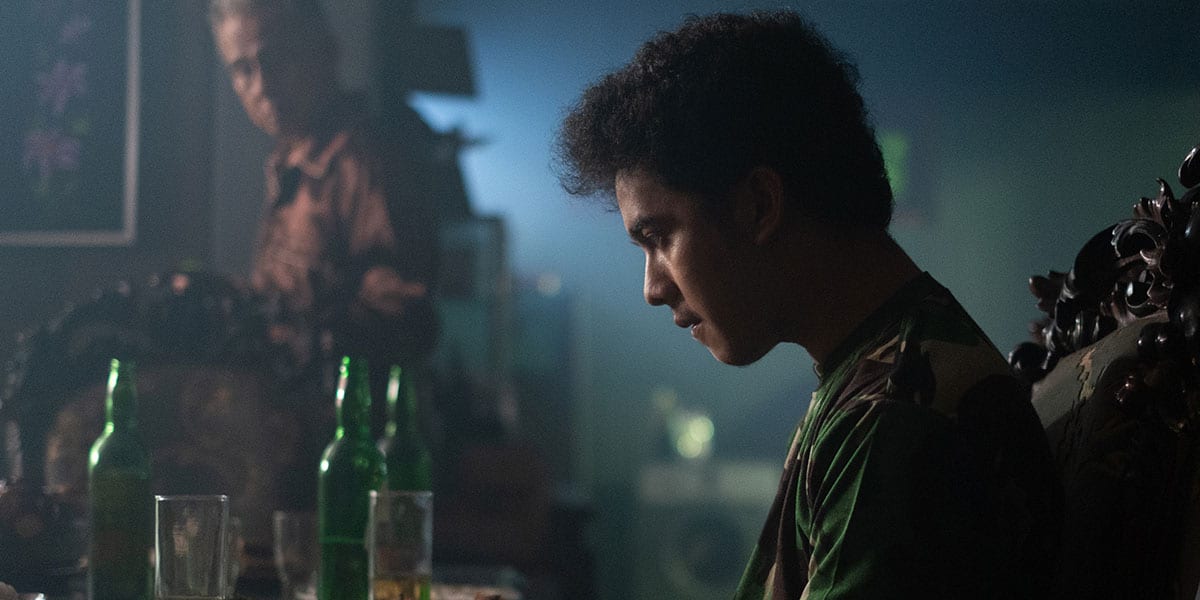
Also, coming back to symbols in the movie, there's a significant symbol, the uniform. I perceive it as a symbol because when the general presents Rakib with it and Rakib puts it on, he seems to transform.
I think the uniform means a power that is borrowed. And in some countries, in countries like Indonesia, you can borrow power from someone. Like, when you want a driving license, you don't have to go through all the tests. You have to know someone who'll help you arrange for that. Corruption comes from the culture of borrowing power from other people. So yes, the uniform is a symbol. But at the same time, in our country, it's very common to see someone wearing it. Like, a guy driving a motorbike without a helmet. And sometimes you want to tell him, “Hey, wear a helmet.” But wait… what if he is in the military… It's better to stay away. So in Indonesia, it creates a sense of uncertainty and tension. If he's a military officer, we are afraid, but if he's not, then we are fooled. So the uniform gives you a sense of grandeur, not necessarily power. You feel more important when you wear it in many places, especially in Indonesian villages.
So from what you have said, I guess that when you meet a military officer, you don't feel safe.
And you're not supposed to feel this because the regime has ended. Yet you feel it. These are also the remnants of the regime.
So what about people representing the regime who are still alive, as you mentioned? Are they still powerful?
Maybe not in the position of the government, and I don't want to point fingers at anyone, but I believe they still have power.
Like the general, who is still a resourceful person.
Some of them want to enter politics after they retire. During the dictatorship regime in Indonesia, you could be a military man and a politician. Most of the governors of provinces were military generals or colonels. But after the regime ended, this had to be separated. So if you're a military officer, you have to retire first to run for a political position. And this is what Purna does.
What is striking and also connected with our discussion about being a good person, is this portrayal of the general… He seems such a nice elderly guy, who is helpful, funny, and talkative, but when it comes to a certain point, the mask disappears. We mentioned the Third Reich and it reminded me of that all those officers who were in charge of death camps. When some of them were recognized and put on trial after decades, they seemed just nice grandpas.
This is the scariest thing about them, they seem such nice people. They're the regular grandpas. You may wonder: is my grandpa like that as well? Purna does what he does not because he is the general. I refuse to believe that every military officer is a bad person. But I think Purna is struggling with his idea of power, with the fact that he lost it. The regime is gone and for him, it is difficult to accept it. He wants to regain power in politics and he is trying to leave a legacy teaching Rakib like a son. And he also nurtures those ideas of the old days that boys are better than girls. So he wants to teach Rakib everything and treat him well. Actually, throughout the film, everything the general does for Rakib, he does from deep care. I wanted to depict Purna as a human being, not a one-dimensional evil character. He is a grandfather. He is Rakib's mentor. But when it comes to power, his expression of it is brutal.
Do you believe in justice?
It depends on the place. In my country, sadly speaking, it's tough to believe in justice. We see it being ridiculed every day in newspaper headlines or the news. So I can say I do believe in the concept of justice. But if the question is do I see it in my country… No.
I asked because there's no sense of justice in the film.
My cinematographer, who is a very nice guy, also asked me that. And told me “Put some hope in the film. If there is a sense of justice, there will be a sense of hope.” I thought about it, but I decided not to. I wouldn't be very honest about the reality of Indonesia.
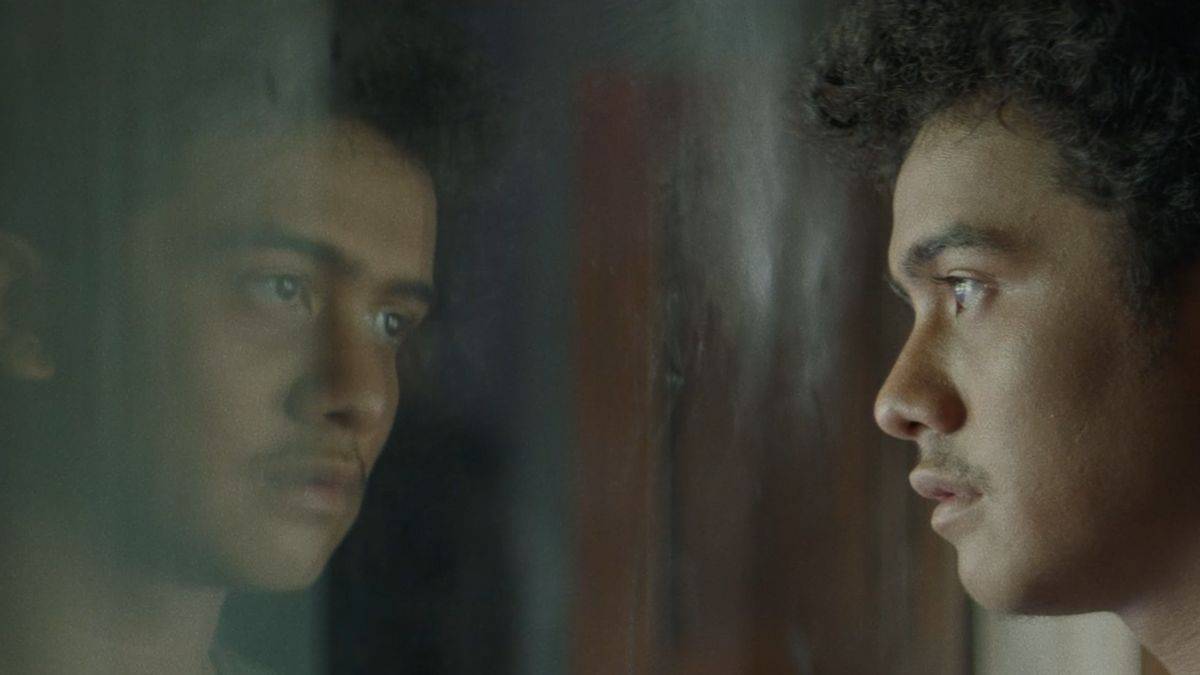
Also, that would be an American story.
It could be an American story, exactly, of a Vietnam War veteran. I wanted to paint an honest emotional portrayal of what we, Indonesians, are feeling. So in the film, you see a lot of things that should be “justified,” but are never justified.
We talked about all those “fathers of something” and fathers of the family. So, what about mothers? Is there a space for mothers?
This question is asked during many Q&As. Where are the women? It's the all-male world. I designed the atmosphere of the film to create a sense of dysphoria. “When did it happen? Is it now or under the dictatorship? Oh, he mentioned the year 2017. Okay, so it must be now. There's a phone, there's a video call. Must be now.” But the sense of the power structure, and the violence feels so much like the past. And this includes the invisibility of women. Because in that era, women were almost absent from the public space. There was even a law in Indonesia stating that the place of women is in the family. And the role of women in the family is to help the man. This is crazy. We still have this law, and it's called The Law of Marriage. The state tries to control how you behave inside your house, which is very weird. And I deliberately wanted to reflect gender relations during that era, as it is still persistent. This is where the problem arises. If there was a mother in the film, I think the texture would be very different. And I think the mother would help them. Though they never listen, the boys never listen. So I want to say something by making the female characters absent. I want to reenact how it feels to live in that era.
There's an interesting layer of sound and an image in your movie. When the camera follows Rakib it's shaky, as if underlying his buzzing emotions. And when it portrays the general, it's steady, reflecting power. I wonder how you designed this sound and image landscape.
The film is about power. It's reflected in every decision we took, and every discussion we had about the aesthetic choices. When we speak about power, the first question that comes to mind is who is the powerful and who's the powerless? And how can we let the audience immerse in that? So, you're right. When we are with the general, things are steady and calm. But Rakib is always uncertain about the situation. So we discussed the visual side from the point of view of power. What happens with the theme of power in this shot? It all goes back to the thematic core of the film. As for the sound, I think it's similar. We divided it into two worlds. There is the world of Purna, which is very calm, and very quiet, like in the house and the car. But once you open the window, you hear the world outside is very different, noisy, and chaotic. We divided the sound into two landscapes. And coming back to images, we dichotomized it into two color schemes. The first part of the film is mostly green… until we arrive in the hospital where Rakib realizes the truth. He walks out of the hospital and the tones turn red and stay red for the remaining duration of the film.
What was your approach to filming the interiors?
I think the point is not to use the camera as a tool of observation. Usually, we just observe the character. At the moment, we are sitting here and watching the girl selling popcorn at the counter. I want the camera to be used as a tool of experience. The camera should experience the space with the character. We always tried to experience the space from Rakib's perspective. We move with him and capture his emotions instead of just observing. So I think this is a very different conceptual approach to using the camera and the space.
I've read in an interview what you told me about the first draft of the script and something caught my eye. That it was going to be a dark comedy. So I am curious about it, because in Poland we have this long tradition of grotesque satire and laughing of some bad experiences. Also, in former Czechoslovakia, there were movies like that. So what kind of movie “Autobiography” would be if it was based on this first draft?
Yeah, I wanted to make a dark comedy. I'll tell you the story from the draft. There's a young actor, who has never had a big role, he only played extras. One day he is invited for an audition and is chosen for the role of a soldier in an autobiographical film (so this was originally the reason for the title) about a very successful general. He is supposed to play him in his youth. The actor has to be trained by the general to act exactly like him. So he has to live with him and his family. He has to eat just like the general. He has to shower just like the general, and the general will train him to do so. So the character is cosplaying the general all the time. Indonesian people enjoyed this idea because they were familiar with this kind of military figure and understood my message. However, during the development, the script became too repetitive. Maybe partially because my sense of humor is not that polished. I also noticed that the concept of a military figure is very different from country to country. Like some guy from Israel who read the script, asked: “You say it's a comedy. Where's the funny part? This is what soldiers do.” So I realized the comedy part doesn't work for foreign audiences. So I decided to rewrite it. But that was the basic idea.
Actually, I enjoy this idea.
Maybe one day… (laugh)
So, last question to wrap up. You came from a film criticism background. Indonesian cinema seems to be at a very good point at the moment because many Indonesian makers are becoming recognized at festivals, like Edwin, Kamila Andini and Joko Anwar. I would like to ask you, from the perspective of a film critic, what is so appealing in stories of these Indonesian makers to audiences outside?
Well, I think it's basically because these filmmakers are emphasizing our similarities instead of our differences. They're not trying to show the world “Hey, we are so different. Look at us.” Therefore, they're not creating an exotic kind of world. They're emphasizing experiences that are common for people who live in Indonesia, Poland, or Canada. These are filmmakers who are constantly trying to find universal human conditions that we all can relate to. And I think this makes them such great creators. Speaking from the perspective of a director, now there are so many sources of support from the government for the filmmakers. Not only from the Indonesian government but also from the Southeast Asian institutions in general. Culture is trying to do a lot of things. It helps us at least travel to promote films and find financial partners. So I think these two factors are important. Although the recognition for Indonesian cinema is still quite limited, limited to festival audiences. We are yet to reach the momentum that, for example, Korean cinema benefits from, getting theatrical releases in many countries. We have to keep our momentum and try to go beyond it. I don't think festivals are the only way to promote our cinema. Of course, festivals are excellent and we all grew from them, but there are also other outlets where the audiences are waiting for good films, and we have to be able to tap into that. So I think this is the next step for us.


